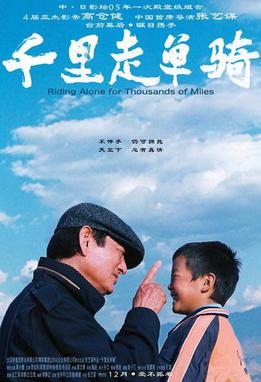 Zhang Yimou (pronounced Jong Yeemo) is officially my favorite foreign director to date. His masterpieces include Raise the Red Lantern, Hero, House of Flying Daggers, and Curse of the Golden Flower. Now we have Riding Alone for Thousands of Miles, which is by no means a masterpiece, but certainly aspires to the greatness I have come to expect from Yimou. Riding is not like his martial arts movies, which most Americans think of when they hear Yimou’s name. Rather, it is more like his stupendous efforts To Live and The Road Home, which show off his ability to craft a story with both human drama and visual beauty.
Zhang Yimou (pronounced Jong Yeemo) is officially my favorite foreign director to date. His masterpieces include Raise the Red Lantern, Hero, House of Flying Daggers, and Curse of the Golden Flower. Now we have Riding Alone for Thousands of Miles, which is by no means a masterpiece, but certainly aspires to the greatness I have come to expect from Yimou. Riding is not like his martial arts movies, which most Americans think of when they hear Yimou’s name. Rather, it is more like his stupendous efforts To Live and The Road Home, which show off his ability to craft a story with both human drama and visual beauty.Riding follows Gou-ichi Takata on a multi-tiered journey of discovery of self, family, and humanity. One thing that strikes me as particularly unique with Riding is that it is a story primarily in
Well, Takakura Ken shakes the swagger and the rest of the actors never had it to begin with. This movie is a delight from the first frame to the very end. As I said, Riding follows Gou-ichi Takata, who lives in a Japanese fishing village far off from his son. When he learns that his son who’s back in
His quest meets obstacle after obstacle, and Gou-ichi’s persistence in and of itself is an astounding thing to behold, but what is yet more astounding is that his journey's purpose becomes multi-tiered as his focus extends beyond himself to those suffering around him. It is hard to describe the complexity of emotion and drama so skillfully shown, but this film was no doubt a great challenge for actor and director alike. There are moments of sadness and moments of levity, and amidst all of the emotion is the gorgeous backdrop of the majestic
If you’re in the mood for a drama and willing to expand your horizons to another culture, give Riding Alone for Thousands of Miles a chance. There is a quality here that
Watchfeel (impact of visuals): +18
Mouthfeel (overall watchability): +17
Number Three
1 comment:
I'm sufficiently intrigued. I'll have to make a point to see it.
Post a Comment